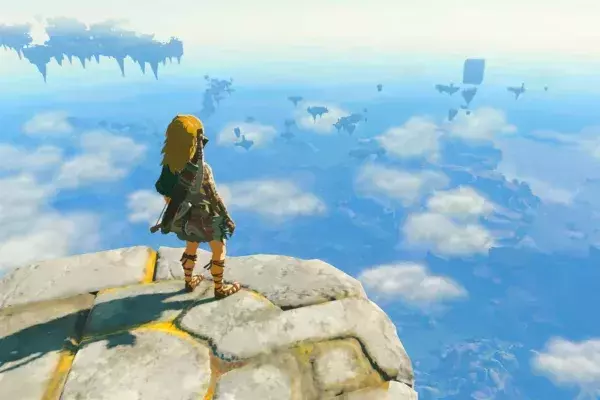
This is the story of a video game called Deus Ex Machina. Some players reckon it changed their lives. It certainly changed mine. First I wrote it, then it put me out of the business for 30 years. Here comes the story.
There are only four elements in any video game ever written: chess, dice, ping-pong, and bullshit. Every shoot-’em-up, all swords-and-sorcery, each adventure or sports simulation, everything and anything that passes for computer gaming is a combination of these elements, remixed and regurgitated. The strategies of chess, the throw of the dice, the hand-eye coordination of ping-pong, and the con-trick of bullshit. And if this is the story of Deus Ex Machina, then it is essentially the story of computerised bullshit on a grand scale.
Six years after starting my video games company back in 1977, I had grown weary of it all. What I wanted to create next was an extension of dreaming, and the time had come for me to dream big time. So I set about creating the world’s first interactive movie.
Deus Ex Machina took me three weeks to design. I wrote the mechanics as a screenplay and gave the instructions for the programmer as a shooting script. It took me another six weeks to write and record the soundtrack. I played all the instruments myself, and I was a rubbish musician, so it took ages to edit out all the bum notes. And the reason I played all the instruments myself was because I couldn’t afford to hire any real musicians.

One of Mel Croucher’s original storyboards, detailing how the audio syncs up with the game’s imagery.
The thing I wanted to achieve with Deus Ex Machina was to force the player to become the active central character, not the passive viewer. And I figured the best way to do that was to get them to go with the flow of the music and the gameplay, so the soundtrack would play inside their head, before dragging them through the screen to live out their entire lifespan in one hour. In 1984 I was restricted to the home-computer capacity of the most popular machine around, which was the 48kB Sinclair Spectrum.
When I was told I couldn’t fit Deus Ex Machina into the 48kB available, it took all of one minute to figure out that I could double that available memory by inviting my players to pause halfway through the game while the computer saved their current score, then flip over the data cassette and wait for the second half to load. Suddenly, the 48kB Sinclair Spectrum could play a 96kB game. And although that seems like a breakthrough in hindsight, I had absolutely no notion it hadn’t been done before.
Sound and vision
Doubling the computer’s virtual memory also meant I needed to package the game on two separate cassettes. One for the soundtrack, the other for the code. I added an audio countdown to the soundtrack, and let players sync the start of each half of Deus Ex Machina themselves. In that way, the soundtrack would run in sync with the action on the screen, or at least as far as stretched magnetic tape would allow.
The game concept was almost irrelevant. I used a sequence of interlinked game-plays, no more original than the stuff I had produced before, but that wasn’t the point. Movies are also a series of unoriginal sequences. It’s the recombination and original presentation of stolen ideas that sells tickets. I wanted to allow players to control the way they reached their inevitable destination. So from the fertilisation of an egg by a sperm, to their own birth, then onwards through the entire process from cradle to grave, it pretty much wrote itself.

Deus Ex Machina’s surreal mini-games took the player on a journey through the human life-cycle.
I thought that very soon all cutting-edge computer games would be like screenplays, with proper structures, real characters and voices, half-decent original stories, an acceptable soundtrack, a variety of user-defined narratives, and variable outcomes. It still gives me great satisfaction when people tell me about the influence it had on them. Mind you, many of them say they were on hallucinogens at the time.
As it happens, Deus Ex Machina became known as a ‘multimedia’ product, slightly ahead of its time. But only by a quarter of a century. The game wouldn’t work without the concept album, and the music wouldn’t mean much without the game. I also wanted to make the packaging an important part of the whole thing, and I bunged in a movie poster, a short story, and an instruction manual. And I made the key image a beautiful robot to hopefully give some of my players crowded trousers. But I never suspected the utter debacle that was about to happen. It stemmed from organised piracy on an industrial scale, and I never even knew it was happening until it was too late.
Deus Ex Machina was just another computer game, but for a few short weeks, I thought I had produced a real winner. The delusion began as soon as the reviews came out. It wasn’t that I was naive or stupid about the possibilities of organised piracy. The thing was, I thought Deus Ex Machina was too complex to get ripped off. After all, it would not be cheap to reproduce a vacuum-moulded presentation case, a double-sided poster and the twin-cassette format. And as for the audio and printed storyline, they were hardly going to come up with the full monty. Were they?

The packaging may have pushed up its cost, but Deus Ex Machina certainly looked and sounded unlike anything else available in 1984.
Cult voices
The total cost of creating Deus Ex Machina was £8,760. That was everything I had at the time, and I spent nearly all of it paying celebrity voices to appear on the soundtrack. Today it’s common practice to hire celebrities to recite in-game twaddle, but because I knew no better, it seems I was the first to do it. I targeted three cult voices, phoned them up, and offered them cash. It was a doddle. I paid Doctor Who’s Jon Pertwee, with his golden voice. I paid the godfather of punk, Ian Dury. And I paid Carry On star Frankie Howerd. Then I ran out of money.
Price wars
In 1984, punters were paying around five quid for a popular video game. A vinyl rock album cost about the same, and so was a trip to the movies. So I got it into my head that seeing as how I was offering players a combination of all three entertainments, the street value should reflect this. Besides, I wanted to recoup my investment sooner than later. And so I overpriced the product at 15 quid, the most expensive price tag of any game at the time. Big mistake. As a premium price product, it made the game a motivational gift to the pirates, but they only bothered to reproduce the computer code cassette and ignored the rest. I still cringe at the thought of a legion of players left completely baffled by a crap silent movie of a naked avatar blundering through a load of dopey sprites.
Deus Ex Machina got the best reviews I’ve ever had for anything, and yet it was a commercial disaster. By the time it was awarded Game Of The Year by the Computer Trade Association and won the Golden Joystick Award, I had gone into an epic sulk, fuelled by disappointment and frustration, because the game simply wasn’t selling enough.
I refused to attend the awards ceremony and disappeared on holiday. I blew it. What is never predictable is how a bestselling creator handles the downward slide towards oblivion. The way I did it was to give up. Then I waited 30 years to remake it, and ended up in a wheelchair.
But that’s another story.
You can read the earlier parts of Mel Croucher’s series here:
Part 1: Automata and the birth of the UK games industry
Part 2: How to grow a raspberry Pi
Part 3: How I made Deus Ex Machina





